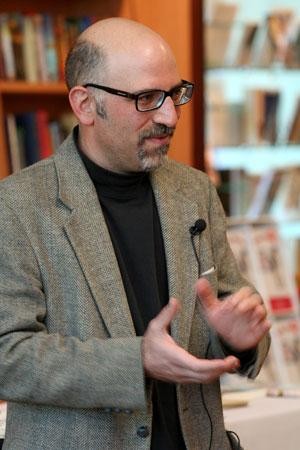Students, faculty and community members gathered yesterday evening to listen to personal accounts of travel in the Middle East, given with the intent to break stereotypes about the controversial area of the world.
Jim Bowman, co-editor of “”Encounters with the Middle East: True Stories of People and Culture That Help You Understand the Region,”” was at the UofA Bookstore along with about 40 other people to celebrate the book’s release.
“”The book idea came from a conversation with (co-editor)Nesreen (Khashan) about how the Middle East is always portrayed,”” Bowman said. “”I was like, ‘What can we do?'””
Both editors have traveled the globe and lived in various Middle Eastern countries. Bowman speaks Turkish fluently.
From their travels they realized that there was more to the Middle East than most people understood.
After peddling their ideas to various publishers, interest arose from a travel-writing publisher. Soon they were collecting and compiling firsthand accounts of people’s travels throughout the Middle East.
“”This is the only textbook that I like and enjoy reading,”” said Christine Siler, a communications freshman who is reading the book for her English 102 course. “”We are only using a couple of stories in class, but I find them all interesting. You are seeing the Middle East in a different, not-so-negative light that seems more realistic.””
Bowman detailed the stereotypes of war and negativity he encountered. He told a story about watching news reports of strife in the Middle East on Christmas and seeing little more than scenes of U.S. soldiers smiling and wishing well to their families back home.
Natives, meanwhile, were shrouded in violence and poverty.
“”I think that the topics discussed are particularly interesting,”” said Sigma Colon, a history graduate student. “”It’s nice to see what the broader community of intellectuals are doing on campus.””
After discussing the stereotypes, Bowman read two stories from the collection in the book to counteract this point. Both showed instances of firsthand accounts from Americans who lived in and visited different areas such as Turkey and Jordan.
One was about an American woman who, because of an abundance of frequent-flier miles, ended up living in Jordan for a month.
She ran into her hotel manager often, and through conversations they came to share their disparate views of America.
She didn’t want to go back. He longed to visit the country and perhaps prosper.
The two became close friends, and Bowman used the tale to illustrate that one can encounter nice people anywhere with enough searching.
More importantly, he said, it’s a fallacy to assume all Middle Eastern people despise Americans.
As the readings ended, the audience’s response was one of sheer approval.
“”I like to travel, and it is very interesting to hear about other people’s travels,”” Siler said. “”It can really make you think, and I like that.””









